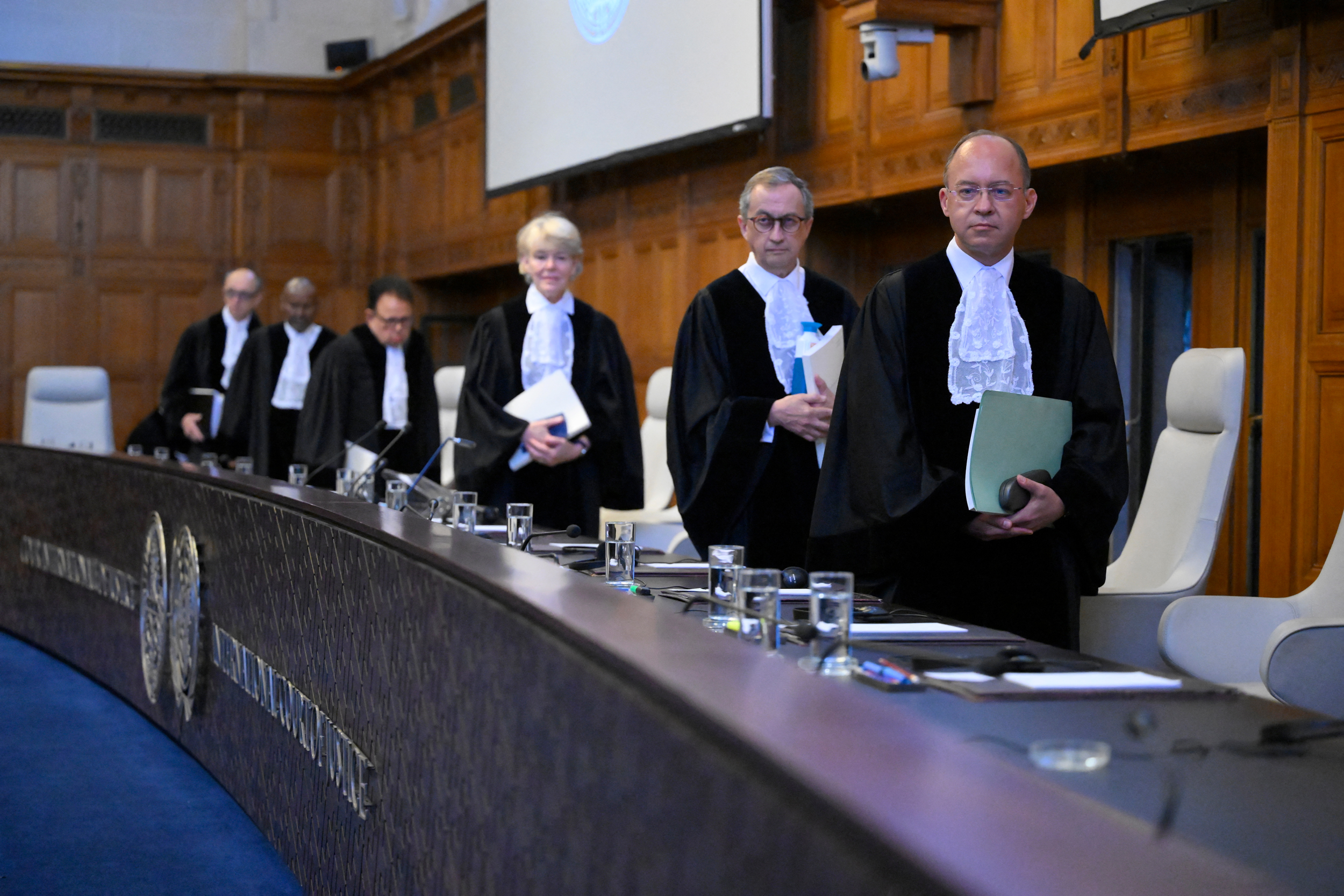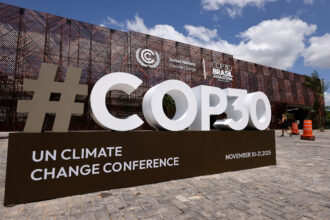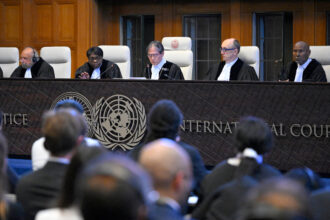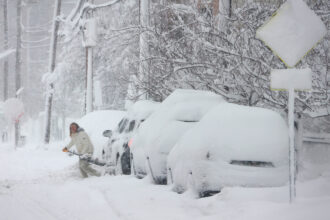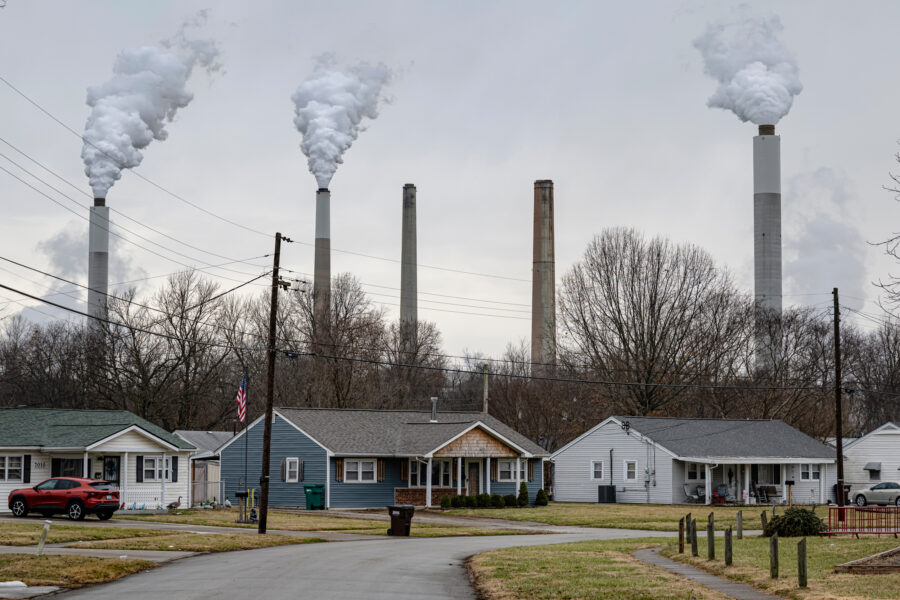Una May Gordon, Jamaica’s former principal director of climate change, noted on opening day of the United Nations climate summit last week in Brazil that her country had recently suffered “catastrophic loss and damage” in the wake of Hurricane Melissa.
“We just need some accountability for those who are definitely responsible for this crisis,” Gordon said, calling for an end to impunity for major greenhouse gas emitting countries.
Climate justice advocates have been demanding this for years, always with science on their side. Now they say the law is, too.
For the first time in the 30-year history of the U.N. climate talks, this year’s negotiations in Belém are happening against the backdrop of a recent landmark ruling from the International Court of Justice—the world’s highest court—clarifying what countries must do to confront the climate crisis under international law, and what the legal consequences are for failing in their responsibilities. In doing so, the Court has turned what many governments treated as political choices into enforceable duties.
In its unanimous, historic advisory opinion delivered in July, the court recognized that the climate crisis is an “existential problem of planetary proportions” and that taking action to mitigate and adapt to it is not optional, but a requirement under multiple sources of international law. The court also found that U.N. member states can be held liable for breaches of their legal obligations to protect the climate system.
Countries like Vanuatu, the small Pacific island state that led the initiative to seek a climate change advisory opinion from the ICJ, are hopeful that the court’s declaration can serve as a turning point in catalyzing more ambitious climate action and infusing more accountability into global climate diplomacy.
“We hope that by the time we get to Belém, this advisory opinion will have permeated through the understanding of everybody who’s at those negotiations,” Ralph Regenvanu, Vanuatu’s minister for climate change and the environment, said on a July panel following the court’s ruling.
While most major emitters are present at Belém, the United States notably is not. It is the first time that the U.S. has not sent an official delegation to the COP—the Conference of the Parties, or 197 nations that agreed to the United Nations Framework Convention on Climate Change in 1992.
Even during Donald Trump’s first term, the world’s largest historical carbon polluter had a presence at the negotiations. Some observers including former UNFCCC executive secretary Christiana Figueres have suggested the U.S. absence might be a good thing, given the current administration’s firm position of climate denial and outright hostility to climate action.
But absence does not mean the U.S. should be ignored or is somehow absolved from its legal obligations, climate law experts say.
“Whether the U.S. is at the COP or not, its impacts are ever-present and demand accountability,” Nikki Reisch, director of the climate and energy program at the Center for International Environmental Law, told Inside Climate News. “The ICJ was very clear. It didn’t cite countries by name. But its message to the United States was unmistakable—that all countries have a duty to prevent climate harm and protect human rights from the impacts of climate change, regardless of whether they are parties to the climate treaties or not. Withdrawing from the Paris Agreement does not absolve the U.S. of its climate obligations.”
In an emailed statement, a State Department spokesperson defended the Trump administration’s action to exit the Paris Agreement, referring to it as a “scam” under which the U.S. would be “expected to contribute far more financially than any other country.”
Advisory opinions, while technically nonbinding, are considered authoritative interpretations of existing law that is binding. And as the principal judicial body of the United Nations, the International Court of Justice brings significant weight and importance to its opinions.
“Withdrawing from the Paris Agreement does not absolve the U.S. of its climate obligations.”
— Nikki Reisch, Center for International Environmental Law
“The U.S., as long as it is part of the UN, is supposed to follow this advice,” Margaretha Wewerinke-Singh, an international lawyer who served as co-counsel for Vanuatu during the ICJ proceedings, said at a press briefing following the ICJ’s issuance of its opinion. “It is as much bound by this advice as other states are.”
The court’s opinion came on the heels of another historic climate change advisory opinion handed down by the Inter-American Court of Human Rights on July 3, which recognized the right to a healthy climate for the first time at the international level.
The International Tribunal for the Law of the Sea also delivered an advisory opinion in May 2024 concluding that states have legal duties to curb greenhouse gas emissions, which constitute pollution of the marine environment. Collectively, these opinions establish that climate action is a legal obligation, the climate law experts say.
But the Trump administration is going above and beyond in the opposite direction. It is doubling down on fossil fuels—the primary driver of greenhouse gas emissions—while dismantling climate and environmental policies, undermining renewable energy, and suppressing climate science. Media reports that the Environmental Protection Agency was about to release its official proposal for repealing its greenhouse gas endangerment finding came out on the very same day as the ICJ’s climate advisory opinion. EPA then issued its rollback proposal on July 29, just days after the world court warned that failure to regulate climate pollution could be deemed unlawful.
What the U.S. government is doing on climate and energy under the Trump administration contravenes not just the science, but also multiple treaties the U.S. government has bound itself to, experts say.
Maria Antonia Tigre, director of global climate change litigation at Columbia University’s Sabin Center for Climate Change Law, told Inside Climate News that the ICJ’s opinion “suggests that the U.S, as one of the largest historical and current greenhouse gas emitters, is very likely in breach of its international obligations—including under customary international law and human rights law—to prevent significant climate harm and to protect the rights of present and future generations.” The court’s opinion, she said, is “far from symbolic” and carries “significant legal and normative weight.”
Reisch said the U.S. is “unquestionably violating international law on climate in multiple ways.”
“The U.S. continues to breach its legal duties to use all means at its disposal to prevent climate destruction through its failure to rein in and phase out fossil fuel pollution, its failure to provide climate finance at scale to developing countries, or to remedy the mounting harms for which it bears outsized historical responsibility,” Reisch told Inside Climate News. “But it’s also violating international law through the reckless expansion of fossil fuels in the midst of a raging climate emergency.”
In one of its most striking statements, the ICJ suggested in its advisory opinion that countries that continue to prop up the fossil fuel industry could be in breach of their legal obligations.
“Failure of a State to take appropriate action to protect the climate system from greenhouse gas emissions—including through fossil fuel production, fossil fuel consumption, the granting of fossil fuel exploration licenses or the provision of fossil fuel subsidies—may constitute an internationally wrongful act which is attributable to that State,” the opinion asserts.
By those standards, the United States, currently the world’s top oil and gas producer, appears to be committing internationally wrongful acts. Reisch pointed to the Trump administration’s reported plans to expand offshore oil and gas drilling including off the California coast as just one of the latest displays of its “flagrant disregard both for climate reality and for legal duties.”
The White House did not immediately respond to a request for comment.

Paul Rink, associate professor of law at Seton Hall Law School who authored an opinion piece arguing that the ICJ’s ruling puts the “U.S. on notice,” told Inside Climate News that there is a “pretty strong case to be made that the U.S. is violating numerous aspects of international law” when it comes to climate change.
“How to hold them accountable for those violations is another question,” Rink added.
Direct enforcement through international mechanisms is limited, Tigre explained. “The U.S. has not accepted the ICJ’s contentious jurisdiction broadly, and there’s no global enforcement body for advisory opinions, she said.
The U.S. withdrew from accepting the ICJ’s compulsory jurisdiction in 1986 following a ruling from the court against the U.S. in a case brought by Nicaragua. This means that, in practice, another country suffering significant climate-related damage could not bring a contentious case against the U.S. before this world court.
In September lawyers representing 15 of the original 21 youth plaintiffs in the Juliana v. United States climate case filed a petition with the Inter-American Commission on Human Rights accusing the U.S. government of violating international human rights law through its perpetuation of a fossil fuel-based energy system.
The petition is the first legal action of its kind to be taken following the release of the climate advisory opinions from the ICJ and the Inter-American Court on Human Rights. But even if the commission takes up the case and agrees with petitioners that their rights have been violated, it lacks enforcement as its recommendations are not legally binding. Nonetheless, its power to name and shame governments has proven effective in some cases.
In terms of litigation in U.S. courts, environmental plaintiffs fighting the Trump administration’s moves to boost fossil fuels and eliminate rules to curtail climate pollution could point to the ICJ’s opinion to bolster their arguments. There is no requirement for courts to accept the ICJ’s stance, but it may still serve as a potential source of persuasive authority, legal experts say.
“Some U.S. courts, particularly at the appellate level, may be open to engaging with it, especially in youth-led or rights-based climate litigation,” Tigre said.
This story is funded by readers like you.
Our nonprofit newsroom provides award-winning climate coverage free of charge and advertising. We rely on donations from readers like you to keep going. Please donate now to support our work.
Donate NowOther legal experts, however, are more skeptical that U.S. courts will follow through on the ICJ’s guidance.
“I don’t anticipate the advisory opinion having much of an impact on U.S. court cases,” Rink said.
Robert Percival, an environmental law professor at the University of Maryland, told Inside Climate News that it is “extremely unlikely that a U.S. court would feel compelled to uphold it.”
Beyond courts of law, there is civil society and the court of public opinion—and that is where the ICJ’s opinion may have more impact for the U.S. government, particularly as the Trump administration continues to pursue a regressive, isolationist approach to climate and foreign policy.
“The U.S. may avoid legal consequences for now, but the reputational and diplomatic stakes are rising,” said Tigre. “Ignoring the ICJ’s findings could reinforce perceptions of the U.S. as an outlier or pariah on the global stage—especially as international consensus coalesces around the legal dimensions of climate action, and as domestic courts worldwide start referencing the opinion and following the ICJ’s interpretation of the law as an authoritative source.”
Disregard of legal obligations “can and should” be triggering political and economic consequences, Reisch said, in terms of diplomatic relations, economic impacts, and “political results at the ballot box and in reputational pressure on leaders in the public and private sector.”
Climate activists in the U.S. could leverage the ICJ opinion as a powerful tool in pushing for more ambitious climate action particularly at state and local levels, such as restrictions on fossil fuels and enactment of polluter pays climate laws.
“An NGO in a state where fossil fuels are being produced for export to the U.S., or where fossil fuels are being imported from the U.S., could try to persuade the state’s domestic courts that this production or importation violates international law.”
— Michael Gerrard, Sabin Center for Climate Change Law
“I think that campaigners and advocates, they will be using this opinion to try to influence policymakers, and particularly state policymakers, to really emphasize that the United States, as the largest historical emitter, does have this obligation to meet its climate goals,” said Jean Su, senior attorney at the Center for Biological Diversity. “At the state level, if you are a climate champion in any way, you should be phasing out fossil fuels.”
Some legal experts say that the court’s opinion may also open up major fossil fuel companies to greater liability risk, especially in countries outside of the U.S., which could in turn impact Trump’s domestic fossil fuel agenda and plans to ramp up exports.
Michael Gerrard, faculty director of the Sabin Center for Climate Change Law, said he was particularly struck by the ICJ’s suggestion that countries that support fossil fuel licensing, production, consumption and subsidies could be committing internationally wrongful acts.
“This could have an effect on the ability of the U.S. to export or import fossil fuels,” Gerrard said. “An NGO in a state where fossil fuels are being produced for export to the U.S., or where fossil fuels are being imported from the U.S., could try to persuade the state’s domestic courts that this production or importation violates international law. For the same reason, U.S. companies that engage in oil or natural gas production abroad could be vulnerable to similar judicial actions.”
Todd Howland, interim director of the Environmental Justice Clinic at Vermont Law and Graduate School, told Inside Climate News this could lead to “huge numbers” of lawsuits globally relative to the number of fossil fuel companies.”
“Eventually the house of cards will come tumbling down, because these corporations operate globally,” Howland said. “And they’re going to have lawsuit after lawsuit in different countries citing the advisory opinions.”
About This Story
Perhaps you noticed: This story, like all the news we publish, is free to read. That’s because Inside Climate News is a 501c3 nonprofit organization. We do not charge a subscription fee, lock our news behind a paywall, or clutter our website with ads. We make our news on climate and the environment freely available to you and anyone who wants it.
That’s not all. We also share our news for free with scores of other media organizations around the country. Many of them can’t afford to do environmental journalism of their own. We’ve built bureaus from coast to coast to report local stories, collaborate with local newsrooms and co-publish articles so that this vital work is shared as widely as possible.
Two of us launched ICN in 2007. Six years later we earned a Pulitzer Prize for National Reporting, and now we run the oldest and largest dedicated climate newsroom in the nation. We tell the story in all its complexity. We hold polluters accountable. We expose environmental injustice. We debunk misinformation. We scrutinize solutions and inspire action.
Donations from readers like you fund every aspect of what we do. If you don’t already, will you support our ongoing work, our reporting on the biggest crisis facing our planet, and help us reach even more readers in more places?
Please take a moment to make a tax-deductible donation. Every one of them makes a difference.
Thank you,

